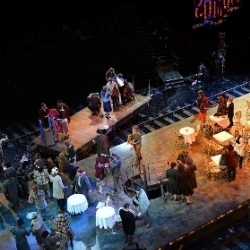La bohème (Royal Albert Hall)
Puccini’s Mimì succumbs amid a wealth of talent and a sea of spectacle
Raymond Gubbay picks his annual Royal Albert Hall offerings from a tiny pool of proven crowd-pleasers, so if you miss your favourite opera one time round it’s no big deal: it’ll soon be back. At eight years La bohème has been absent longer than most, but now here it is again, chugging its post-war way into designer Peter Davison‘s evocative Parisian rail terminal.

© Paul Sanders
In some ways Puccini’s tear-jerker is a curious choice for a large-scale arena production. Two of its four acts take place in a tiny garret room and only Act 2, set in the bustling Café Momus, lends itself to spectacle. Yet so committed are the staging and performances in Francesaca Zambello‘s production that the cavernous spaces seem to draw in and make it feel like opera up close.
Cards on the table, I had not expected to enjoy this Bohème half as much as I did. More than enjoy: I marvelled at its execution, revelled in the extravagant production values and wept in all the right places. Zambello’s name hasn’t always been synonymous with sensitivity and good judgement, but here, abetted by Oliver Gooch at the helm of a pitch-perfect Royal Philharmonic Orchestra, she gets everything right.
One rewarding pleasure is to follow individual chorus members through the crowd scenes during Acts 2 and 3, because the micro-direction of the masses (by a six-strong team of directorial assistants and choreographers) is consistently thrilling to watch. Each character has a three-dimensional existence and follows a convincing trajectory. Moreover, together with the Capital Arts Children’s Chorus they fill the Albert Hall with crisply articulated choral contributions.
The amplification of solo singers remains a ticklish issue, but it’s done as sensitively as it could be and the ear soon adjusts. The main difficulty, most evident in the dizzyingly busy café scene, is to identify who’s singing when the sound picture is so generalised.
As the four main roles are triple cast it’s pot luck who performs on any one night. To the good fortune of Saturday evening’s audience, an indisposed tenor meant that the appealing but vocally overly-dramatic Mimì of Alyson Cambridge was partnered by a terrific Rodolfo from another cast. Not having access to a programme (a long story) I wasn’t aware of the singer's identity until after the performance, so I assumed that Gubbay had recruited a rising star from lands afar and was preparing to beg opera companies to take note. Instead the message is far simpler: why is Essex-born James Edwards not already a hot international property? His plangent timbre, at once romantic and heroic, is a rare enough beast and makes him the ideal Italianate tenor.
Add the beguiling Musetta of Zulimar López-Hernandez and ZhengZhong Zhou as her puppy-dog Marcello, throw in Joshua Bloom‘s resonant Colline, Stefano de Peppo‘s lively Schaunard and Henry Waddington‘s consummate comedy cameos as Benoît and Alcindoro, and La bohème's pedigree speaks for itself. It’s even performed in Italian (with discreet yet legible English surtitles) – a new and welcome step for the company. It is all quite ridiculously entertaining.












